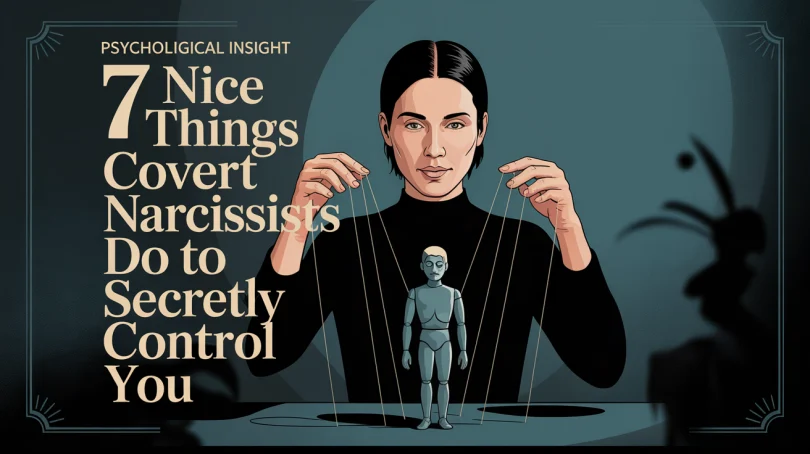Most of you are well aware of the harmful tactics of a covert narcissist: projection, gaslighting, blameshifting all those things that they say and do to make you feel insecure and inadequate, and to keep you constantly questioning your worth and reality. But narcissists also have ways of manipulating you that can feel good at the moment tactics that might even seem positive or loving on the surface but are just as damaging.
1: Fake Flattery
Covert narcissists often use excessive flattery not out of genuine admiration, but as a calculated tactic to control and manipulate others. So, it’s not an occasional compliment; this is a pattern of exaggerated praise, often delivered at emotionally vulnerable moments to create a sense of dependency and obligation and to distract you from their harmful behavior.
They might shower you with compliments about your intelligence, your beauty, and your talent in ways that feel disproportionate or out of context. And it might give you a fleeting sense of validation and acceptance, but it’s followed by whatever it is that they need from you.
Related Topics:
Understanding the 4 Types of Narcissism
5 Sneaky Tactics Narcissists Use to Target Innocent Souls
10 Hidden Motives Why Narcissists Pretend to Be Nice(
8 Forbidden Questions That Narcissists Avoid At All Costs
Once they get what they want, you’ll be dismissed, leaving you questioning their sincerity. And if you don’t comply, you’ll see a shift: that flattery quickly turns to criticism, blameshifting, gaslighting, guilt-tripping, playing the victim all those nasty tactics to make you feel like you owe them something or like you’re a bad person. Number two is giving gifts and doing you favors.
2: Gifts and Favors
Reciprocity is a natural social principle; it’s the idea that when someone does something nice for you, you feel a natural desire to do something nice for them to return the favor. It’s the foundation of building trust and creating a sense of balance and cooperation in relationships. But a narcissist knows exactly how to manipulate this principle to their advantage. They’ll give you gifts or do small favors for you, but it’s not out of genuine generosity.
Instead, it’s a way to make you feel indebted to them. They’ll treat their small, effortless gestures as huge sacrifices and make sure you’re fully aware of how much they’re doing for you. And they’ll start expressing disappointment and frustration about what you’re contributing in return, even if it’s the furthest thing from the truth. So, their gifts and favors turn into this huge weight around your neck, and it feels like a constant pressure to pay them back. But no matter how much you give or how much you do, it’s never enough. Number three is conditional rewards.
3: Conditional Rewards
A covert narcissist uses all kinds of small rewards as subtle but powerful tools to control your behavior and keep you emotionally dependent on them. These rewards don’t have to be big because they starve you and punish you for long periods before offering these tiny, conditional rewards. And yes, there’s always strings attached.
It’s like an unwritten contract where you’ll need to continue bending over backward to meet their ever-changing expectations, always validating them and giving them what they want to get that little treat whatever it might be in the moment. It can make you feel good because it provides relief from the negative emotions you’re experiencing as a result of their chronic dissatisfaction, devaluation, and punishments.
However, the fleeting relief only reinforces the cycle, making you crave more of these small, inconsistent rewards. And over time, you will be constantly seeking their approval, and validation, working harder and harder to prove your worth, hoping that if you get it right, you can get back that good version of them and maybe live happily ever after. Number four is providing helpful advice.
4: “Helpful” Advice
A covert narcissist loves to push their all-knowing wisdom onto others. At first, it might seem like they’re sincerely trying to help you become the best version of yourself. But you will soon realize that the focus is always on you correcting yourself on what you’re lacking and how you need to step up. So, they make you feel like you’re always falling short, implying that if you follow their advice, there might be hope for you.
They point out your flaws and shortcomings, framing them as helpful suggestions, and positioning themselves as your therapist. This feeds their sense of superiority, keeping you in the wrong and in a perpetual state of self-improvement where they get to judge whether or not you’re good enough. The problem is, no matter how much you change or how much effort you put into this, it will never be enough. Number five is praise laced with critiques.
5: Praise Laced with Critiques
Otherwise known as backhanded compliments, a covert narcissist will often give compliments that seem positive but are designed to keep you feeling insecure and constantly striving for their approval. These compliments are laced with subtle criticism.
So, for example, they might say, “You’re so smart; I wish you’d apply yourself more you could do so much more,” or “You’re great at planning things; it would be awesome if you followed through on those plans,” or “You look amazing today; I wish you’d put that effort in every day,” or they might tell you how much better you are at something than some other person.
And again, this positions them as the judge of who is worthy and who is not. So, while their praise can seem positive, these critiques that they insert in the compliment are meant to undermine your confidence and self-worth. Number six is offering just enough affection and intimacy.
6: Just Enough Affection
This is about offering just enough affection and intimacy to keep you invested in the relationship. So, after long periods where they’re distant and withholding emotional and physical intimacy, suddenly they come back, giving you attention, affection, or se*x making you feel like you’re being rewarded for your patience, your loyalty, and your compliance.
But these moments of affection are inconsistent, and they create this emotional push-pull that keeps you hooked on them. So, it’s not about connection; it’s about control. And over time, you’ll find yourself constantly striving to earn more of these rare moments of intimacy.
7: Making You the Savior
Number seven is making you feel like you’re their savior. So, a covert narcissist will share just enough of their vulnerabilities to draw you in and get you emotionally invested in them early on in the relationship. They might share insecurity, past trauma, or deep fear, and they’ll often do this when they sense you pulling away or when they want to elicit a strong emotional response from you.
This selective vulnerability creates the illusion of emotional intimacy, making you feel special. And they’ll tell you that they’ve never shared this with anyone else before and that no one else understands them like you do making you feel like you’re their savior and leading you to believe that you’re indispensable.
But once you take on the hero role, you’ll find that it’s a never-ending cycle. No matter how much you give or how hard you work for them, the problems never truly go away; it’s always something else. And instead of appreciating you, they’ll start to expect, demand, and feel entitled to your help and your support as though you owe them.
And they’ll get more and more resentful and disappointed when you can’t fix everything. This will leave you feeling drained and obligated to continue trying to save them, even when they’re doing very little to help themselves or to help you.
As time goes on, you just get more and more entangled in their needs and their problems, and you lose sight of your own needs, your boundaries, and your sense of identity. And if you start to set boundaries or focus on your own needs, you’ll be accused of not caring, of being selfish. And you’ll probably quickly find out just how dispensable and disposable you are.
So, if you find that you’re relating strongly to these examples and descriptions or you’re experiencing emotional distress because of your relationship, consider reaching out to a mental health professional who specializes in narcissistic abuse.







Leave a Comment